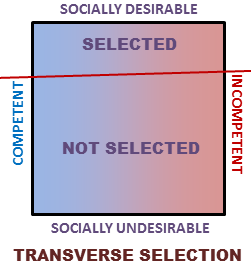 Phaticized work is defined as a covert and often unconscious form of corruption in which organizational resources are diverted to personal ends by way of social instincts.
Phaticized work is defined as a covert and often unconscious form of corruption in which organizational resources are diverted to personal ends by way of social instincts.
Phatic is a term borrowed from linguistics, where it refers to speech that serves a social function rather than conveying information. For our purposes, phatic refers to any workplace activity that perhaps appears to serve the organization’s mission, but actually serves a social function that either does not genuinely support the mission or undermines it.
Today’s example of phaticized work is gladhanding.

 University of Pennsylvania social network researcher Lynn Wu recently discovered a perfect example of
University of Pennsylvania social network researcher Lynn Wu recently discovered a perfect example of  Not to stray too far into politics, but one of the purposes of New Gov Office is to save government from the corruption and paralysis of tactical obsession.
Not to stray too far into politics, but one of the purposes of New Gov Office is to save government from the corruption and paralysis of tactical obsession.